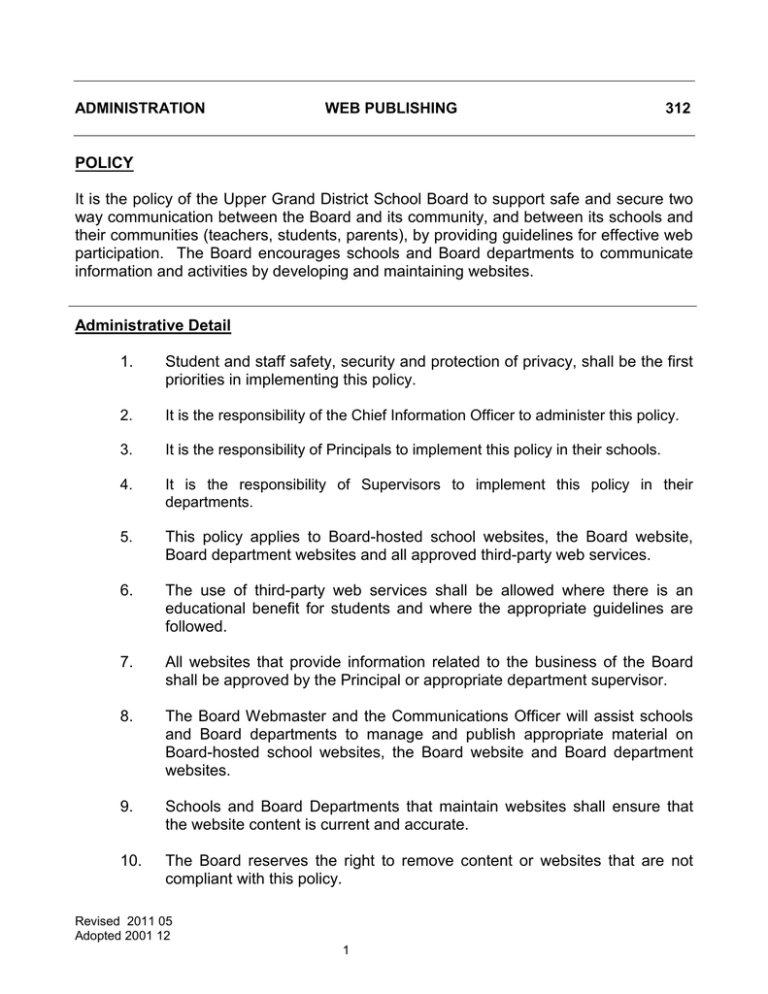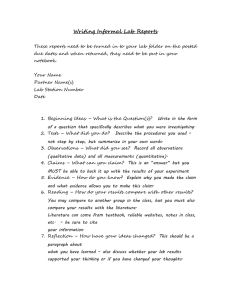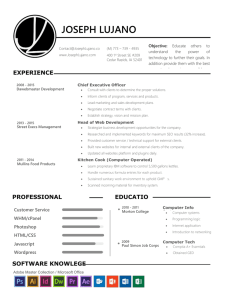ADMINISTRATION WEB PUBLISHING 312
advertisement

ADMINISTRATION WEB PUBLISHING 312 POLICY It is the policy of the Upper Grand District School Board to support safe and secure two way communication between the Board and its community, and between its schools and their communities (teachers, students, parents), by providing guidelines for effective web participation. The Board encourages schools and Board departments to communicate information and activities by developing and maintaining websites. Administrative Detail 1. Student and staff safety, security and protection of privacy, shall be the first priorities in implementing this policy. 2. It is the responsibility of the Chief Information Officer to administer this policy. 3. It is the responsibility of Principals to implement this policy in their schools. 4. It is the responsibility of Supervisors to implement this policy in their departments. 5. This policy applies to Board-hosted school websites, the Board website, Board department websites and all approved third-party web services. 6. The use of third-party web services shall be allowed where there is an educational benefit for students and where the appropriate guidelines are followed. 7. All websites that provide information related to the business of the Board shall be approved by the Principal or appropriate department supervisor. 8. The Board Webmaster and the Communications Officer will assist schools and Board departments to manage and publish appropriate material on Board-hosted school websites, the Board website and Board department websites. 9. Schools and Board Departments that maintain websites shall ensure that the website content is current and accurate. 10. The Board reserves the right to remove content or websites that are not compliant with this policy. Revised 2011 05 Adopted 2001 12 1 ADMINISTRATION WEB PUBLISHING 312 11. This policy will be reviewed by the Chief Information Officer or designate as required. 12. This policy operates in conjunction with the Web Publishing Procedures Manual 312-A, Board Policy #318 Acceptable Use of Digital Technology, and the Digital Technologies Acceptable Use Handbook (the Technology Handbook). 13. This policy also operates in conjunction with the Copyright Act (Canada), the Personal Information and Protection of Electronic Documents Act (Canada) (PIPEDA), the Education Act (Ontario), the Municipal Freedom of Information and Protection of Privacy Act (Ontario) (MFIPPA), the Personal Health Information Protection Act (Ontario) (PHIPA), Accessibility for Ontarians with Disabilities Act (AODA), and other relevant legislation and Board policies. Revised 2011 05 Adopted 2001 12 2 ADMINISTRATION A. B. WEB PUBLISHING PROCEDURES MANUAL 312-A INTRODUCTION 1. The Upper Grand District school Board supports the appropriate use of digital technologies to support student achievement and communicate to the school community and the public. 2. The Board recognizes the changing nature of technology and continues to work to remain current while providing the school community with increased opportunities for the use of new technologies and applications. 3. Any activity that relates to the operation of the Board and/or the education of students is considered the business of the Board. All staff, students and agents of the Board including, but not limited to School Councils, the Parent Involvement Committee, and the Student Senate must take this into consideration when using technology to communicate about the business of the Board. 4. The appropriate use of websites and web services, which include html pages posted to websites, rich media, and social networking sites including, but not limited to Facebook, YouTube, and Twitter, is outlined in the Board’s Digital Technologies Acceptable Use Handbook (the Technology Handbook). CONTENT AND STANDARDS FOR PUBLIC WEBSITES HOSTED BY THE BOARD This section provides mandatory requirements for the Board’s website, Board department websites and school websites hosted by the Board. 1. Mandatory Requirements – Board-Hosted Websites a) All websites will provide a homepage-link to the main Board website. b) The Board logo will appear on the homepage. c) All websites will include disclaimers (see the Technology Handbook) pertaining to: i. personal information and privacy; ii. external links; Revised 2011 05 Adopted 2001 12 3 ADMINISTRATION WEB PUBLISHING PROCEDURES MANUAL 312-A iii. copyright, and iv. student and/or teacher websites. 2. d) All websites will use a generic e-mail contact for communication. e) All information posted to websites is the responsibility of the appropriate administrator (Principal or Supervisor). f) All websites will adhere to the requirements in the Board’s Technology Handbook. g) All websites should reflect current and accurate information. h) Websites will not include any identifying information such as personal phone numbers, personal addresses, or personal e-mail addresses for staff or students. i) Websites will not include any advertisement, logo, testimonial or endorsement of any product or company except for official partnerships. j) Websites may contain links to external sites provided that the guidelines in the Technology Handbook, and Policy #318 Acceptable Use of Digital Technology are met, and a disclaimer is clearly displayed. Mandatory Requirements for Third-Party Websites a) Administrative usernames and passwords and URL for all third-party web services will be duly registered and updated on a Boardmaintained database. Registration is completed by logging into the Third Party Web Services Tracking Application (Windows username and password) at https://app.ugdsb.on.ca/webservicetracking/ and entering all the required information. b) All information posted to websites is the responsibility of the appropriate administrator. c) All websites will provide an e-mail contact for communication with the administrator of the site. Revised 2011 05 Adopted 2001 12 4 ADMINISTRATION 3. WEB PUBLISHING PROCEDURES MANUAL 312-A d) All websites will adhere to the requirements in the Board’s Technology Handbook. e) All websites should reflect current and accurate information. f) It is the responsibility of the administrator of the site to shutdown or lockdown the web service once it is no longer monitored or moderated. g) Websites will not include any identifying information such as personal phone numbers, personal addresses, or personal e-mail addresses for staff or students. h) Websites will not include any advertisement, logo, testimonial or endorsement of any product or company except for official partnerships. i) The Board assumes no responsibility for any costs associated with, or loss of data from third-party web services used by Board employees. Safety and Security (Student Safeguards) a) No personal information or photographs shall be posted on websites without written informed consent of the parent/guardian or adult student if eighteen (18) years of age or older, or a student 16 years of age and older and removed from parental control. b) With informed consent, when photos of students are posted, they will not include students’ last names. c) With informed consent, students work (for example: art, writing, science projects) may be posted with a first or last name, but not both. d) No school floor plans will be posted on Board websites. e) No un-moderated content will be permitted. Revised 2011 05 Adopted 2001 12 5 ADMINISTRATION C. WEB PUBLISHING PROCEDURES MANUAL 312-A COPYRIGHT 1. It is not legal to use work (hard copy or electronic version of graphics, video, audio, text) created by others without the creator’s permission. 2. Copyrighted materials may not be reproduced or transmitted via the Board’s equipment, including its web server, without permission. 3. Webmasters must comply with copyright regulations. 4. Students retain copyright on materials they create that are posted on the web. 5. Employees may retain copyright when consistent with Board policies. 6. Schools must obtain permission from owners of copyright when including material created by others. 7. Schools must include a copyright notice to others regarding the use of staff or student materials. Revised 2011 05 Adopted 2001 12 6


